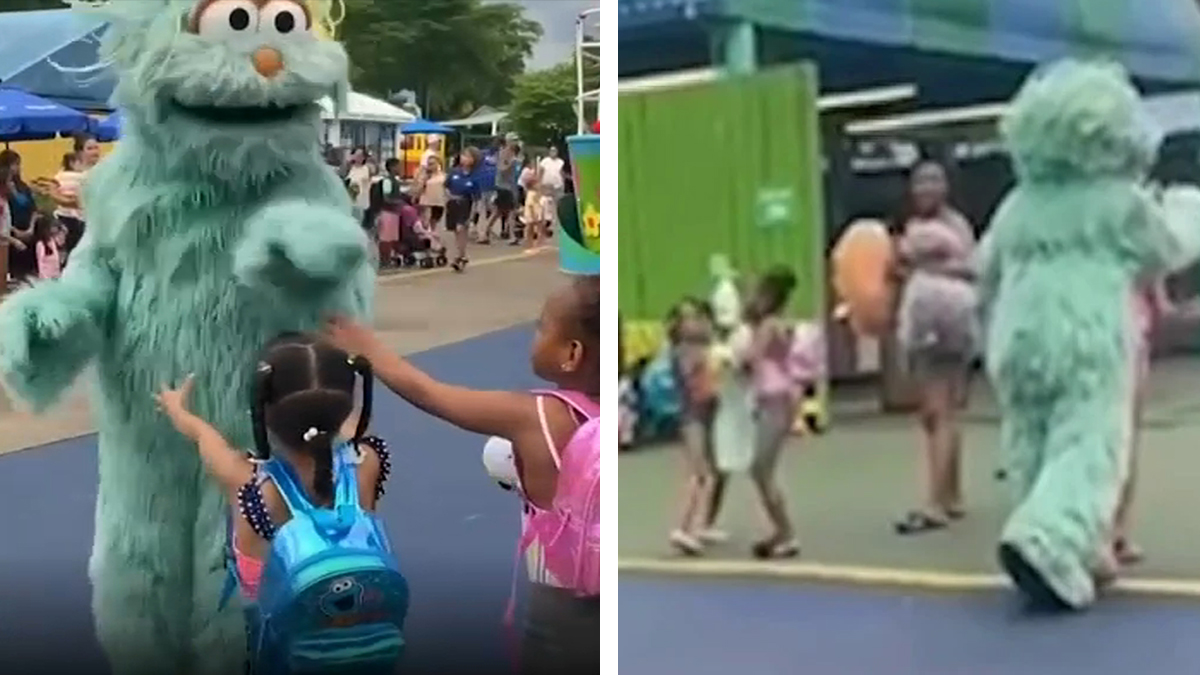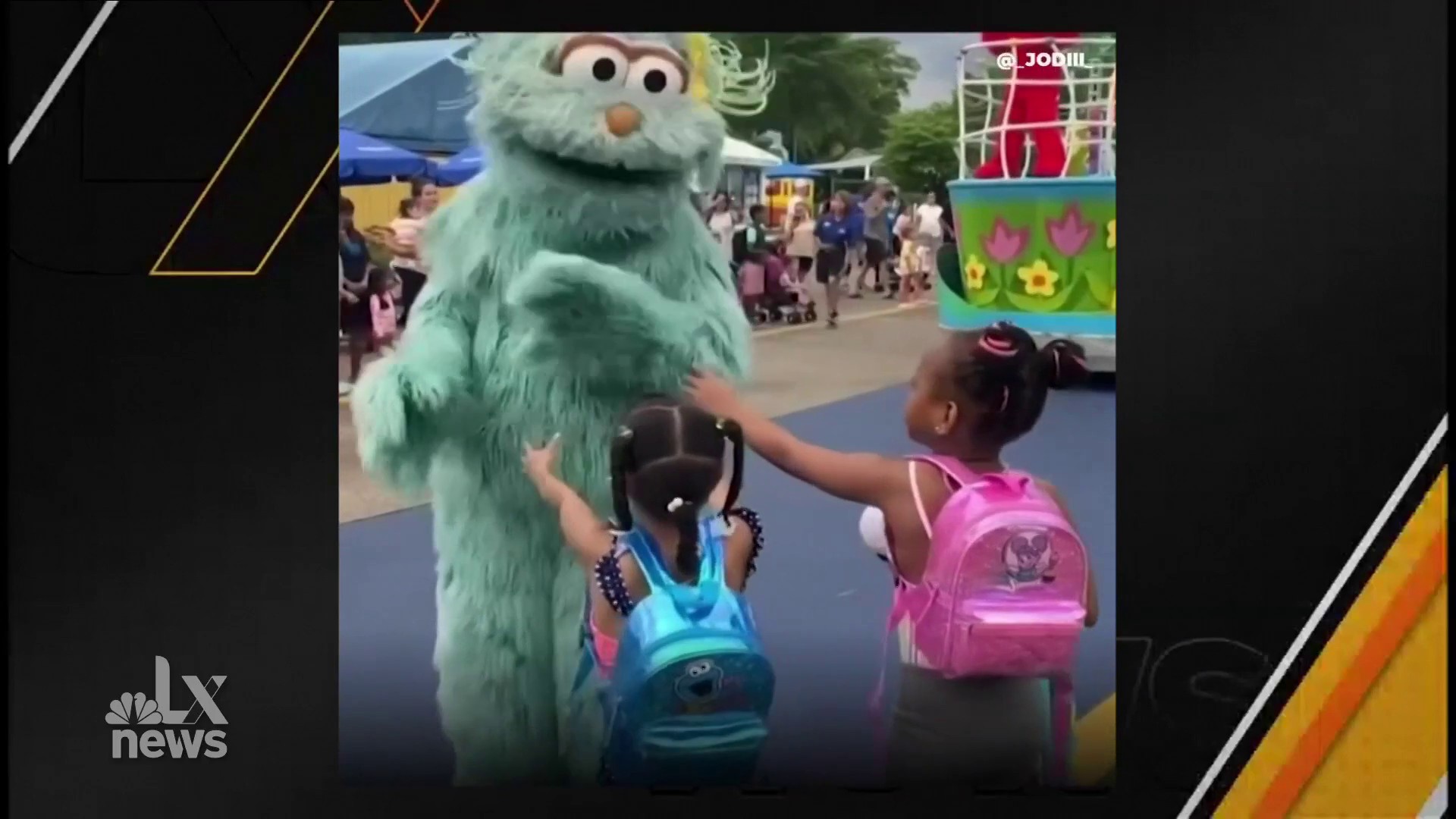Lee esta historia en español aquí.
Following a high-profile case of alleged racial discrimination against two Black girls, SeaWorld is being sued for other alleged instances of “pervasive and appalling” discrimination against children at Sesame Place Philadelphia.
The plaintiffs named in the lawsuit are Baltimore, Maryland, residents Quinton Burns and his 5-year-old daughter, who allege that four performers refused to engage with the girl and other Black children during a meet-and-greet last month. The performers did “readily” engage with “numerous” white kids, according to the suit.
“Racism is horrible when it’s perpetrated against adults, but it’s in a separate category altogether of horror when it’s perpetrated against kids who can’t fight back and who have to struggle to understand how ugly it is and how it must be eliminated from every aspect of American life,” William Murphy, one of the lawyers for the Burns family, said at a Wednesday afternoon press conference in Philadelphia.
Get Tri-state area news delivered to your inbox.> Sign up for NBC New York's News Headlines newsletter.
The plaintiffs are seeking at least $25 million in damages from SeaWorld Parks and Entertainment – which owns Sesame Place – on behalf of all Black people who visited Sesame Place since July 27, 2018, and “suffered disparate treatment” from SeaWorld employees who ignored Black children “while interacting with similarly situated white children.”
They're demanding a jury trial.
The suit states that on or around June 18, Burns bought two tickets to the Bucks County, Pennsylvania, theme park, which entitled him and his daughter to meet-and-greets. They tried to participate in a meet-and-greet, but the performers – dressed as Elmo, Ernie, Telly Monster and Abby Cadabby – ignored them and other Black children while interacting with white children, the lawsuit asserts.
The lawyers for the family released a video that shows the girl standing in line during a parade of performers. The Telly Monster character walks over and crouches down, apparently greeting other children in front of the girl as she reaches her hand out. The character then walks away, seemingly waving at other children as the girl turns toward the camera and frowns.
The video then cuts to the Ernie character high-fiving children near the girl, but as she extends her hand toward him, he walks away while waving to others in the line before rejoining the parade.
“SeaWorld breached its contracts with the Burns and Class Members when, solely due to their race or color, and by and through its agents and/or employs, it publicly and discriminatorily denied Plaintiffs the opportunity to enjoy the experience of meeting and greeting the Sesame Street costume character performers as promised,” according to the suit.
The suit also says SeaWorld knew the performers harbored racial bias against Black people.
In a statement, Sesame Place said it is reviewing the lawsuit and is committed to delivering "an inclusive, equitable and entertaining experience for all our guests."
The Burns brought the suit after seeing a viral video of another incident of alleged discrimination that happened to a family from New York. That video showed a performer dressed as the character Rosita seemingly ignoring two young Black girls while then reaching toward another girl – who the family’s lawyer said was white – and giving her a hug.
The lawyer for that family, B’Ivory LaMarr, called the incident a “racist act.” The girls’ mother and aunt has demanded the performer be fired, but she has said that she would rather avoid a lawsuit. LaMarr said Sesame Place should be made to cover any expenses related to the mental health of the girls, who he said are now dealing with “severe emotional distress.”
Sesame Place originally said the performer’s costume may have made it difficult to see the girls and that the “no” gesture made by the character in the first video was not specifically aimed at the pair. The gesture, the park said, was made in “response to multiple requests from someone in the crowd who asked Rosita to hold their child for a photo which is not permitted.”
Asked for comment about the new video on July 22, the theme park pointed NBC10 to a statement saying that it “wholeheartedly” apologized to the family and that what the girls experienced was “unacceptable” and “antithetical to our values, principles and purpose.”
The park said it was reviewing its practices and instituting mandatory training for all employees to deliver an “equitable” and “inclusive” experience to guests.
Since then, other families have come forward to allege racism at Sesame Place Philadelphia. LaMarr said that more than 150 families have reached out to him and his law firm alleging similar conduct from performers at the park. In a statement, his firm said it is continuing to review the merit of those cases.
The firm said also that it has not contacted the lawyer for Burns and does not plan to join the suit at the moment.
Meanwhile, Burns, the plaintiff from Maryland, said he was “hurt” and “devastated” by the alleged treatment of his daughter.
The lawsuit also seeks an order requiring SeaWorld to implement mandatory cultural sensitivity training for its employees.



